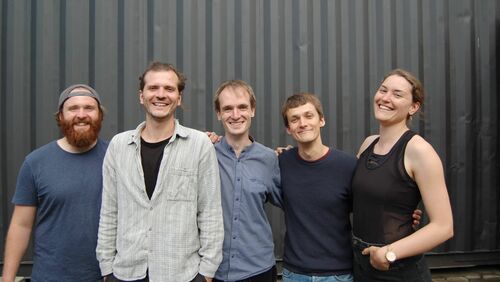New materials can help to avoid negative environmental impacts. Ideally, more regionally anchored value chains and low-energy material cycles will also emerge. The MycoLutions team is working on such a solution – based on mushrooms. An important ingredient here: local residues such as coffee grounds! Our editor Olaf Ledderboge reports on an innovative start-up that has docked at HAW, is supported by the start-up service there and beyourpilot, and wants to bring an environmentally friendly sound insulation system to market.
Our well-being and health are incredibly closely related to the quality of our living and working places. Noise protection and room acoustics play an important role in workplace safety and when it comes to designing productive and healthy spaces. The mushroom enthusiasts Thies Lingner, David Gradl, Theresa Oberstraß, Felix Schimmeyer and Helge Schritt are now working with their start-up “MycoLutions” to develop an environmentally friendly and room climate-friendly sound insulation from mushroom mycelium. They met during their studies, where they were fascinated by the idea of closed material and product cycles. Since then, they have been preoccupied with the question of how to manufacture products in such a way that no waste is produced? Which are completely recyclable? Which are perhaps even based on the waste of other products?
Financial support and know-how
To find out, they are now receiving the EXIST start-up grant for one year. They were supported in their successful application by beyourpilot start-up advisor Lisa Jessen. The funding includes direct financial support, i.e. personnel costs and material resources, but also access to rooms and resources at the university. An important part of the funding for the team is also the support from science partners: for example, the team is supported by the mentor Professor Friedrich Ueberle, who is an expert in the field of acoustics, noise protection and noise measurement technology.
Environmentally friendly materials sought
Many materials and substances that we deal with every day are based on petroleum as a raw material. Besides numerous advantages in use, these everyday plastics also have disadvantages. Points such as environmental compatibility, recyclability, energy and raw material input during production and, depending on the material, even a toxic effect in the human organism, play an important role in the assessment of the materials. That is why people all over the world are looking for more environmentally friendly alternatives. One of these alternatives are materials based on fungi or, better, fungal mycelium.
Fungal mycelium as a biological material
Mycelium is the term used to describe the overall network of cells that make up a fungal organism. In contrast to the often compact fruiting body – which is the part of the mushroom we eat in edible mushrooms – the mushroom mycelium can form a very extensive and close-meshed network. This meshwork can be dried and processed so that versatile material forms and properties become possible. Properties similar to those of foam plastics are already realistic, which could be used, for example, for building insulation, as packaging protection or as sound absorbers.
The idea came during the Master’s thesis and with coffee grounds
Already during his studies, Helge Schritt, for example, recognised the potential of fungi as a basis for new, environmentally friendly materials. In his Master’s thesis, he dealt with an investigation into the utilisation potential of old substrate. This material is the cultivation material that accumulates in mushroom farms. For example, mushrooms grow very well on a mixture of wood chippings, straw and other organic nutrients. Coffee grounds are also very suitable as a nutrient supplement, as they are produced in large quantities in the catering industry, for example. The material not only stimulates Helge Schritt’s imagination, but other comrades-in-arms are soon found, and MycoLutions is born.
The network
Between Hamburg and Lüneburg, a small but fine mushroom scene has developed in recent years. The projects are somewhere between a tinkerer’s garage and environmental science laboratory research. For example, part of MycoLution’s research work takes place in the non-profit association Curious Community Labs e. V. in Hamburg’s Oberhafen. However, already established cultivation operations for edible mushrooms are also involved. While one group raves about the potential of mushrooms as a building material or special material, the others use their expertise to cultivate edible mushrooms on a larger or smaller scale. A current project from Hamburg – also with the participation of the MycoLutions team – is “Green Water”. On the basis of mycelium floats, old port industrial channels and canals are currently being renatured with floating water plant islands on a test basis and with scientific support.

